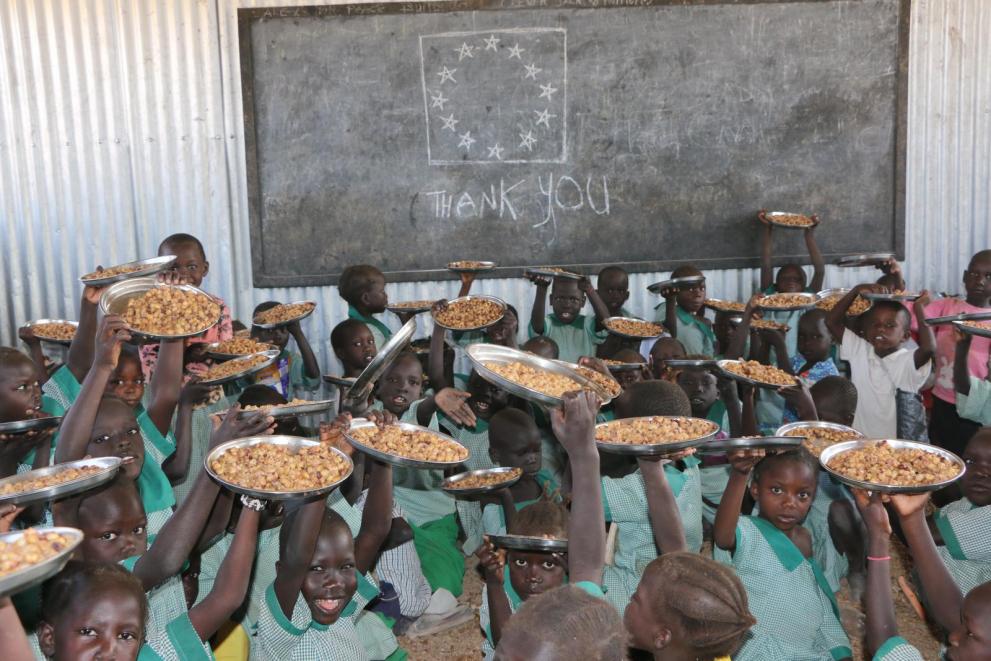
The European Union and the World Food Programme (WFP) provide a daily hot meal to pupils, many of whom fled conflict in South Sudan.
Kalobeyei settlement, north-west of Kakuma refugee camps, is now home to 38,000 people, most of whom fled conflict in South Sudan. The settlement is designed to bring refugees and local communities together in a mutually beneficial relationship. School children make up more than one third of the settlement’s population: 14,000 young children attend the three primary schools in the settlement.
WFP is providing a daily hot meal to the schools’ learners, which is funded by the European Union Emergency Trust Fund for Africa as part of the Kalobeyei Integrated Social and Economic Development Plan.
A catering challenge
Until recently, Kalobeyei settlement primary school was the only school in the settlement. With the population quickly rising, learners had to attend lessons in two shifts as the available classrooms could not accommodate the numbers. Fortunately, with the opening of two other schools, the number of students has reduced to 5,700.
The sharp rise in the number of school-going children in Kalobeyei is due to the increase in y South Sudanese families coming to Kenya, not only in search of safety, but also in search of education for their children.
WFP is providing one hot meal a day to the students in all three of Kalobeyei’s schools, most of whom come from the refugee community. This meal is attracting and keeping children in the classrooms.
“We have five jikos (fireplaces) in our two kitchens and the fire hardly ever goes off,” says Josephine Nadi, a cook at the Kalobeyei settlement primary school. “For the food to be ready in time, we start cooking at ten o’clock at night. We stay in the kitchen overnight,” adds Josephine.
Josephine, who comes from South Sudan, is one of the 11 cooks employed at the school. She says that even though they work long hours, they are passionate about fulfilling their duties.
“We start serving the children from 9.30 in the morning and finish at around 1 o’clock in the afternoon,” she says. “I do it as a service — despite the difficult circumstances. This meal is very useful for our children.”
In addition to supporting the hot meals, WFP also recently donated almost 5,000 plates to the school.
“Before, we had a big shortage of utensils. The staff would feed one lot of students, clean the plates and feed the next lot, until all had eaten,” says Nick Lomorukai, the school’s head teacher. “It was a very tedious process. Now we’ve assigned each child in the upper classes a plate. It is their responsibility and they are expected to return it once they have completed their studies.”
Improving learning
As the number of children attending school continues to grow, additional support is needed to ensure they receive a quality education. “We don’t have enough teaching staff. Most of our classes have over 250 pupils, five times more than recommended,” says Nick. “This is affecting the quality of education.”
With UNHCR and UNICEF taking the lead, partners are continually working to better the learning environment in the settlement. Funding provided by the European Union Trust Fund is contributing to this.
Business for local traders
At the beginning of this year’s second school term (April — June), WFP started providing cash direct to the schools so they could buy food for the school meals straight from the local market.
“This is a better model,” says Nick. “We don’t experience disruptions in supplies.”
With so many students to feed every day, the school requires large amounts of food. Every day the school cooks over 600 kg worth of food; a mix of maize, beans, fortified vegetable oil, and iodised salt — all of which is now being bought direct from the local market.
This is translating into more business for the local traders, contributing to the overall objective of supporting refugees while developing the local economy. The cash transfers to schools have so far contributed close to 6.6 million Kenyan shillings (about US$66,000) to the local economy.
WFP is now also working on empowering the local farmers to increase and improve production so that they can provide food direct to schools through the market for the government’s home-grown school meals programme.
Details
- Publication date
- 5 January 2018
- Region and Country
- Kenya
- Thematic
- Greater economic and employment opportunities
- Partner
- Food and Agriculture Organization
- United Nations High Commissioner for Refugees
- UNICEF
- World Food Programme
